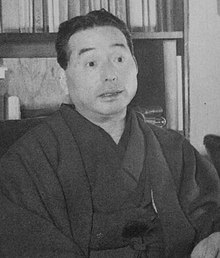Yoshida Tomizo
Yoshida Tomizō ( Japanese 吉田 富 三 ; * February 10, 1903 , † April 27, 1973 ) was a Japanese medic ( pathology ) and cancer researcher.
Yoshida studied medicine at the Imperial University of Tokyo , where he received his doctorate in 1927 and was then assistant in pathology. In 1929 he became a member of the Sasaki Institute of the Kyōundō Hospital ( 杏 雲堂 病院 , English Kyoundo Hospital ) in Tokyo, whose director he was last. He was also the director of the Institute of the Japanese Cancer Research Foundation.
In the mid-1930s, he and his boss, the institute's founder , Sasaki Takaoki , demonstrated the carcinogenic effect of the dye Biebrich scarlet fever (more precisely its active ingredient o-aminoazotoluene ). They were able to produce liver cancer in rats and mice through regular oral administration, the first evidence of such cancer production in an internal organ.
He has taught at Nagasaki Medical School , Tōhoku Imperial University, and Tokyo University .
In 1959 Yoshida was awarded the Order of Culture , in 1963 he received the Robert Koch Prize .
literature
- Obituary Z. f. Cancer Research, Volume 80, 1973, p. 1
- S. Noma (Ed.): Yoshida Tomizō . In: Japan. An Illustrated Encyclopedia. Kodansha, 1993, ISBN 4-06-205938-X , p. 1758.
Web links
Individual evidence
- ↑ Yoshida Virchows Archiv Path.Anat., Volume 283, 1932, p. 29 ( Metaplasia of epithelial cells of the thyroid gland of guinea pigs), Yoshida, Sasaki, Virchows Archiv, Volume 259, 1935, p. 175 and Yoshida in the Japanese journal for cancer research Gann , Volume 28, 1934, p. 441 (liver cancer with regular oral administration in rats and mice)
- ↑ 吉田 富 三 . In: 世界 大 百科 事 典 第 2 版 at kotobank.jp. Retrieved July 19, 2012 (Japanese).
| personal data | |
|---|---|
| SURNAME | Yoshida, Tomizo |
| ALTERNATIVE NAMES | 吉田 富 三 (Japanese) |
| BRIEF DESCRIPTION | Japanese medic (pathology) and cancer researcher |
| DATE OF BIRTH | February 10, 1903 |
| DATE OF DEATH | April 27, 1973 |

